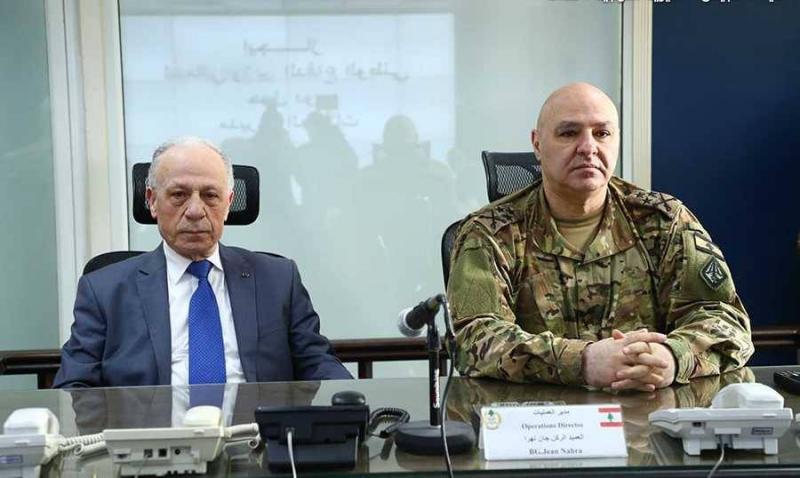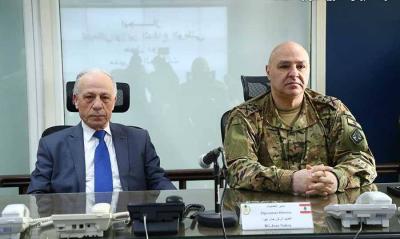Signs of a political conflict are emerging between the National Defense Minister in the caretaker government, retired Brigadier General Maurice Sleem, and Army Commander General Joseph Aoun, regarding the appointment of an officer to manage the affairs of the Army's Inspector General, following the retirement of Major General Milad Iskak at the end of last year upon reaching legal retirement age. This clash could have been avoided if the relationship between the Minister and the Army Commander had remained uninfluenced by the insistence of former President Michel Aoun to settle scores with General Aoun, with direct involvement from the head of the "Free Patriotic Movement," Deputy Gebran Bassil, accusing him of leading a "coup" against the President by allowing those who rose against the ruling regime on October 17, 2019, to control the streets and public squares, which led to the resignation of Prime Minister Saad Hariri’s government without army intervention to clear the demonstrators.
In this context, sources informed "Asharq Al-Awsat" that the cordiality between President Aoun and General Aoun has been declining since that time, particularly because the latter refused to use force against the demonstrators, instead providing them with a road map to maintain civil peace and protect public and private property, while ensuring freedom of movement for citizens. This led to the army units, present in most regions, intervening at the right time to prevent security breaches and block international roads, sometimes dealing strictly with protesters under the pretext of maintaining stability as a condition for freedom of expression.
Political sources revealed that President Aoun’s relationship with General Aoun began to deteriorate with the former accusing the latter of leading a "coup" against him, although he was the one who chose General Aoun to lead the army. It was noted that President Aoun often criticizes him in front of his visitors, alongside his ongoing attacks on the leader of the "Mard" Movement, former Deputy Sleiman Frangieh, emphasizing his determination to oppose both in their aspirations for the presidency.
The sources highlighted that President Aoun provides political cover for the Minister of Defense in his disagreement with the Army Commander, while Bassil personally oversees propaganda campaigns targeting him in an attempt to distort his image domestically and internationally, given the rising international support for him as a potential presidential candidate, despite his avoidance of officially announcing his candidacy.
The sources opined that the disagreement regarding the appointment of the officer tasked with managing the affairs of the Army's Inspector General does not warrant such a dangerous commotion. The Minister could have appointed the officer had he initiated consultation with General Aoun, as nothing prevents him from communicating, even for the sake of soliciting opinions, rather than entering an unjustified dispute that only serves Bassil and President Aoun, who chose the right moment to criticize him, citing his leadership of a "coup" against him.
They noted that the other side of the campaign is not exclusively about the Minister of Defense's appointment authority, but rather President Aoun and Bassil aimed to exploit the escalating disagreement, believing it is an opportune time to target General Aoun and undermine his credibility both domestically and internationally, particularly as his name tops the list of presidential candidates alongside Frangieh.
The same sources mentioned that Sleem chose Colonel Melhem Haddad to manage the Inspector General's office without consulting General Aoun, who believed that respect for seniority, as promised by the Minister of Defense, necessitated the appointment of the Army's Personnel Director, Colonel Jreis Melhem. This was rejected by Sleem, forcing General Aoun to place Haddad at the disposal of the Army Command.
They pointed out that it happened that Melhem and Haddad were in the office of the Inspector General, which required placing the latter at General Aoun's disposal. This annoyed the Minister of Defense, leading him to refrain from signing a decision to appoint Melhem instead of the dentist Colonel Haddad, who is among the officers currently active in the Inspector General's office.
However, the disagreement between General Aoun and Minister Sleem had started earlier when the Military Council decided to appoint Colonel Khalil Jaber to the Military Court to succeed Brigadier General Ali Haj, who retired on October 1, while the Minister of Defense refused to sign the decision on the grounds that the Military Court directly reports to him. Therefore, Colonel Jaber, who is among the officers not promoted to the rank of Brigade General, currently works in his office at the Military Court, managing administrative affairs until a resolution to the dispute allows him to assume his duties, which are temporarily handled by the reserve prosecutorial body in the Military Court.




